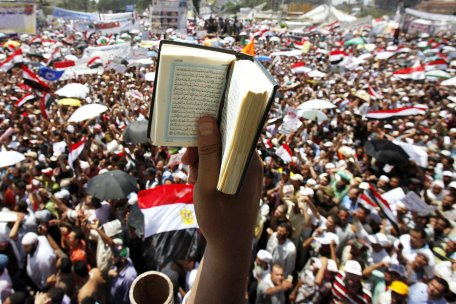A Glance at Egypt’s Future Policy: Brotherhood to take prudent steps

By: Davoud Ahmadzadeh
For many of Egyptians, it is almost unbelievable that they can participate in an election not directed by Hosni Mubarak and his family. The January 2011 revolution, although followed by great financial loss and many Egyptian lives-- and fierce resistance of the Egyptian High Council-- is now flourishing. During a year after the fall of former dictator Mubarak, because of the serious efforts of the military to remain in power and not to accept structural reforms-- through severe repression of protests leaving 17 dead during the last weeks--political tensions and the people’s protests have prepared a favorable context for a protracted crisis and increasing political and social violence.
All of these issues did not stop the parliamentary election, and the people’s participation has been very high in the last two rounds. The 60-percent participation of qualified voters shows a valuable experience of democracy in the country. Apparently the third round of the elections will be accompanied by the victory of the Islamists, led by the Brotherhood (the Freedom and Justice Party), and the secular and liberal currents can do nothing against this certain victory. The results of the first two rounds have shown that secularists were incapable of achieving favorable results due to the lack of the people’s support and targeted planning, while liberal leaders list the reason for this defeat as lack of sufficient budgets and an unwritten understanding between the Muslim parties and the military regarding holding the election in the due time. The evidence does not reveal that the secular leaders have accepted the results, and consequently the Muslim Brotherhood is preparing itself for rivalry with the military and the affiliates of Mubarak’s regime on the one hand, and for the probable interaction with the Salafist currents in the process of political power division on the other.
Although the Brotherhood has reached an agreement with the military council over holding the parliamentary election and preventing the people’s protests, it was strategic, and the future relationship between these two groups cannot be devoid of challenges, since the Muslim Brotherhood, with a religious background and the people’s support, cannot agree to the military policies regarding continued use of force and police procedures against the people, and also simultaneous attempts of the colonels to maintain the traditional relations with the US and Israel. As a result, through gaining experiences from the past and reducing the increasing political violence, the Brotherhood will try to hold the final round of the election in a calm atmosphere; therefore, the leaders of the Muslim Brotherhood think that achieving power is possible via multi-party elections and extensive public participation, aware that violence and political tensions existing in society will not fulfill their objectives. Some people argue that the Muslim Brotherhood, having secret relations with the military and the US, promised that in case of victory in the parliamentary election they would be liable to the provisions of the Camp David Agreement and maintain relations with the West, and would not arrive at any compromise with the Salafists (as the second Islamist group) over the cancellation of the agreement. Nevertheless, the Brotherhood is still effective with the military: although the colonels of Mubarak’s reign mostly support secularists and liberals, the middle-ranking military officers are not opposed to the Ekhvan al-Moslemin, or its newly established party.
However, the managerial model of the US for Egypt is decreasing domestic radicalism and maintaining the minimum strategic benefits in the country. Undoubtedly, some of the radical Islamist currents evaluate domestic and foreign priorities of the Brotherhood as an innovation, shift in goals and a withdrawal, while the Muslim Brotherhood, adopting a realistic viewpoint about the political and social arena, the regional upheavals and the limitations and impediments, will try to determine their priorities in new Egypt.

